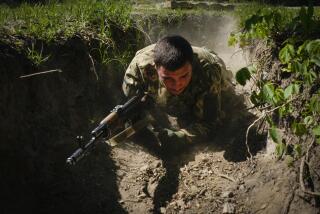Many Help Youths Evade Red Army Draft : Latvia: Residents are forming an underground network to spirit young men away. Top officials of the republic have given their unequivocal support.
- Share via
RIGA, Soviet Union — Edgars Murnieks, 19, vanished from the face of the earth Wednesday, or tried his best to.
Eriks Lubans also worked hard at disappearing, quitting his job and apartment without leaving a forwarding address. So did seven other youths employed as customs inspectors at the railway station here in the Latvian capital.
As the Soviet Defense Ministry began deployment of thousands of paratroopers to enforce military conscription in this Baltic republic, an extensive and widely supported underground network was being assembled to spirit young men away from the Red Army’s clutches.
“People are coming to us who are ready to house these boys, to feed them and take care of them,” Anita Stankevitcha, leader of the Latvian Women’s League, said. “How we help these young men now is a very important test of the solidarity of Latvian society.”
Latvia’s Supreme Soviet has given its unequivocal support to such efforts by authorizing immediate and indefinite leave for 5,000 young men who chose to perform two or three years of public service at home rather than be drafted into the Soviet army.
The legislature’s decision, adopted overwhelmingly, was intended to give the youths, ages 18 to 20, additional time to shift places of residence and cover up their tracks.
“We have to be realistic; we cannot defend these boys to the Soviet army, but we can hide them,” Romualdas Razukas, head of Latvia’s pro-independence People’s Front, said.
For Moscow, Latvia’s law creating an alternative to the constitutionally mandated duty to serve in the Soviet armed forces is a brazen refusal to assume a fair share of the nation’s defense burden and a violation of President Mikhail S. Gorbachev’s order that military conscription be enforced everywhere.
All three Baltic Republics, which seek full independence from Moscow, have been targeted by the anti-draft-dodging campaign announced Monday by the Defense Ministry. According to local sources, about 8,000 draft dodgers and deserters are being hunted in Latvia, another 8,000 in Estonia and 10,000 in Lithuania.
For months the Women’s League has been aiding conscientious objectors and Latvians who have gone AWOL from the Soviet military, and the organization’s cramped second-floor offices in Riga’s Old Town were abuzz Wednesday as three women worked the telephones to ensure the safety of the young men enrolled in Latvia’s “alternative service.”
“They called my home and convinced my mother it was time to change my address,” said a grateful Lubans, 19.
By Wednesday afternoon, the mustached Riga youth, who had worked since last August in the republic’s customs service, was living in a different apartment and debating whether to leave the capital altogether.
The Women’s League, which has a contact file of the men in the “alternative service,” is also compiling a list of available hide-outs, with an ideal spot being “the apartment or village home of someone these boys have absolutely no past relation with,” said Stankevitcha.
Shortly after 2 p.m., Murnieks, the duty officer at the headquarters of the Latvian Customs Department, received a telephone call from a worried Woman’s League worker advising him that military units were reported on Riga’s outskirts and recommending that he “go underground.”
The policeman’s son, who said he would refuse to serve in the Soviet Union’s “army of occupation,” had already taken his precautions.
“Tonight I leave for a village three hours from Riga,” Murnieks said. He plans to stay there with the parents of his sister’s boyfriend.
The involvement of Latvian government officials in the effort to save the young men was immediately obvious.
For instance, seven young men had been scheduled to show up at Riga’s main train station Wednesday morning to search outbound freight cars for banned items. In an attempt to halt an outward drain of consumer goods, Latvia’s Council of Ministers now requires an export license for shipment of eggs, sewing machines and many other items out of the republic.
Taking their cue from Tuesday’s Supreme Soviet decision, two of the men didn’t show up for work at all--”They are already on the run,” a delighted co-worker said.
An order telephoned by Victor Mentukov of the customs service took care of the five others, who were told to sign a hastily prepared piece of paper declaring they had gone on leave and then to make themselves scarce.
Before going into hiding, some of the Latvian youths voiced fears of what might happen if they were captured by the Soviet Army. Rough hazing and sometimes-fatal mistreatment of Baltic conscripts by the army has become a chronic problem.
Latvia’s leaders, meanwhile, watched with growing apprehension the developments in neighboring Lithuania and predicted the same sort of disorders could break out soon in Riga.
“As we see in Lithuania, it was right after the decision to send in more troops that organized action began outside the Parliament, and we can forecast with a high degree of probability that the same sort of thing will start in our republic tomorrow. . . ,” First Deputy Prime Minister Ilmars Bisers said in an interview. Officials of the pro-independence government and their supporters braced for a mass demonstration by pro-Moscow forces, including the hard-line Latvian Communist Party, outside government headquarters here today.
About two dozen people gathered beside the steps of the Latvian Council of Ministers’ building Wednesday to oppose government-imposed price hikes on food that took effect Jan. 3 and raised retail prices on bread, dairy products and meat an average of 300%.
More to Read
Sign up for Essential California
The most important California stories and recommendations in your inbox every morning.
You may occasionally receive promotional content from the Los Angeles Times.










